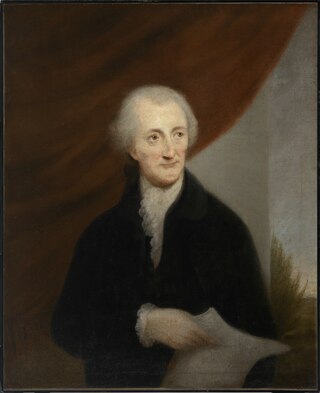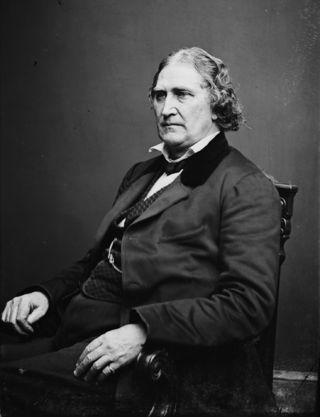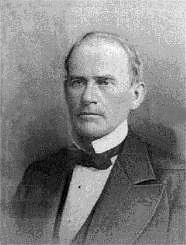Related Research Articles

Thomas McKean was an American lawyer, politician, and Founding Father. During the American Revolution, he was a Delaware delegate to the Continental Congress in Philadelphia, where he signed the Continental Association, the Declaration of Independence, and the Articles of Confederation. McKean served as a President of Congress.

George Read was an American politician from New Castle in New Castle County, Delaware. He was a Continental Congressman from Delaware, a delegate to the U.S. Constitutional Convention of 1787, president of Delaware, and a member of the Federalist Party. In addition, Read served as U.S. Senator from Delaware and chief justice of Delaware.

John Dickinson, a Founding Father of the United States, was an attorney and politician from Philadelphia, Pennsylvania, and Wilmington, Delaware. Dickinson was known as the "Penman of the Revolution" for his twelve Letters from a Farmer in Pennsylvania, published individually in 1767 and 1768, and he also wrote "The Liberty Song" in 1768.

Richard Bassett was an American politician, attorney, slave owner and later abolitionist, veteran of the American Revolution, signer of the United States Constitution, and one of the Founding Fathers of America. He also served as United States Senator from Delaware, chief justice of the Delaware Court of Common Pleas, governor of Delaware and a United States circuit judge of the United States Circuit Court for the Third Circuit.

John Middleton Clayton was an American lawyer and politician from Delaware. He was a member of the Whig Party who served in the Delaware General Assembly, and as U.S. Senator from Delaware and U.S. Secretary of State.
James Sykes was an American lawyer and politician from Dover, in Kent County, Delaware. He served in the Delaware General Assembly and was a Continental Congressman from Delaware.

James Asheton Bayard Jr. was an American lawyer and politician from Delaware. He was a member of the Democratic Party and served as U.S. Senator from Delaware.

Caleb Prew Bennett was an American soldier and politician from Wilmington, in New Castle County, Delaware. He was a veteran of the American Revolutionary War and the War of 1812, and a member of the Democratic Party who served as Governor of Delaware.

David Hazzard was an American merchant and politician from Milton, in Sussex County, Delaware. He was a member of the Democratic-Republican Party, then the National Republican Party, and finally the Whig Party. He served in the Delaware General Assembly, as Governor of Delaware, and as an associate justice of the Delaware Superior Court.

Charles Polk Jr. was an American farmer and politician from Big Stone Beach, in Milford Hundred, Kent County, Delaware. He was a member of the Federalist Party, and later the Whig Party, who served in the Delaware General Assembly and twice as governor of Delaware.
William Barkley Cooper was an American politician from Laurel, in Sussex County, Delaware. He was a member of the Federalist Party, then later the Whig Party, who served in the Delaware General Assembly and as Governor of Delaware.

William Henry Harrison Ross was an American politician from Seaford, in Sussex County, Delaware, United States. He was a member of the Democratic Party who served as Governor of Delaware.
Charles Thomas was an American lawyer and politician from New Castle, in New Castle County, Delaware. He was a member of the Democratic-Republican Party, who served in the Delaware General Assembly and as Governor of Delaware.

Gove Saulsbury was an American physician and politician from Dover, in Kent County, Delaware. He was a member of the Democratic Party, and he served in the Delaware General Assembly and as Governor of Delaware. He led opposition to civil rights for African Americans in Delaware.
The Delaware Constitution of 1792 was the second governing document for Delaware state government. The Constitution was in effect from its adoption, on June 12, 1792, until it was replaced, on December 2, 1831, by a new Constitution.
The Constitution of the State of Delaware of 1897 is the fourth and current governing document for Delaware state government and has been in effect since June 10 of that year.
Thomas Cooper (1764–1829) was a Delaware lawyer and politician who was a Federalist member of the United States House of Representatives. He served in the 13th and 14th congresses.

Willard Hall, was a Delaware attorney and politician from Wilmington in New Castle County. He was a member of the Democratic-Republican Party, who served in the Delaware Senate, as a United States representative from Delaware and as a United States district judge of the United States District Court for the District of Delaware. He served as the first President of the Delaware Historical Society, was President of the state Bible society, and was instrumental in the formation of the Wilmington Savings Fund Society as a community bank, serving as its president for more than 40 years.

The drafting of the Constitution of the United States began on May 25, 1787, when the Constitutional Convention met for the first time with a quorum at the Pennsylvania State House in Philadelphia, Pennsylvania to revise the Articles of Confederation. It ended on September 17, 1787, the day the Frame of Government drafted by the convention's delegates to replace the Articles was adopted and signed. The ratification process for the Constitution began that day, and ended when the final state, Rhode Island, ratified it on May 29, 1790.
References
- Hoffecker, Carol E. (2004). Democracy in Delaware. Cedar Tree Books, Wilmington. ISBN 1-892142-23-6.
- Munroe, John A. (1993). History of Delaware. University of Delaware Press. ISBN 0-87413-493-5.
- Martin, Roger A. (1984). A History of Delaware Through its Governors. McClafferty Press, Wilmington.
- Scharf, John Thomas. (1888). History of Delaware 1609–1888. 2 vols. L. J. Richards & Co., Philadelphia.
- Delaware Code Annotated (1975). Constitution of the State of Delaware. Michie Company, Charlottesville.